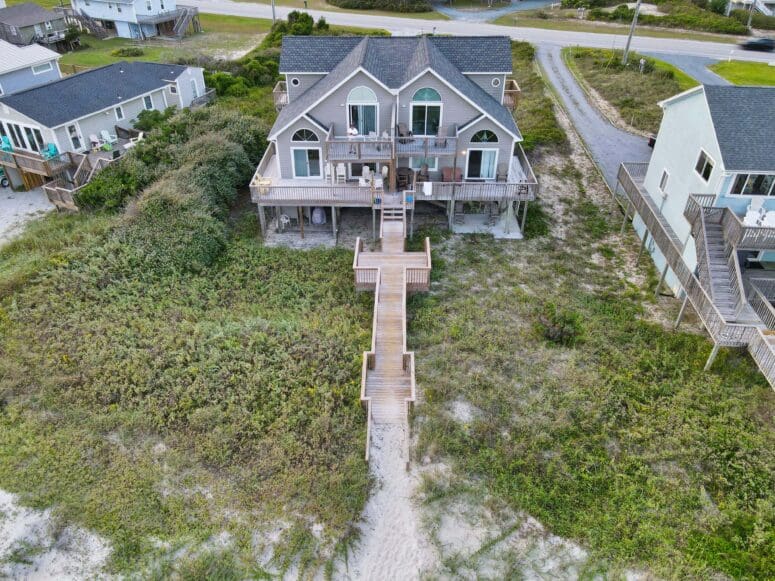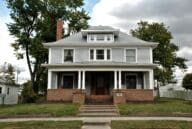Cash Home Buyers North Carolina: The Ultimate Guide for Sellers
- Published on
- 11 min read
-
 Kelsey Morrison Former HomeLight EditorClose
Kelsey Morrison Former HomeLight EditorClose Kelsey Morrison Former HomeLight Editor
Kelsey Morrison Former HomeLight EditorKelsey Morrison worked as an editor for HomeLight's Resource Centers. She has seven years of editorial experience in the real estate and lifestyle spaces. She previously worked as a commerce editor for World of Good Brands (eHow.com and Cuteness.com) and as an associate editor for Livabl.com. Kelsey holds a bachelor’s degree in Journalism from Concordia University in Montreal, Quebec, and lives in a small mountain town in Southern California.
North Carolina is home to some of the hottest housing markets in the country. In a recent U.S. News ranking, Raleigh, Durham, and Charlotte all landed in the top five. The state’s strong buyer demand, coupled with rising interest rates, is leading to an increase in all-cash home purchases. As a result, homeowners considering selling their properties may find the current market particularly advantageous for receiving cash offers.
In this guide, we’ll explore effective strategies for finding reputable cash home buyers in North Carolina. We’ll also discuss the process of selling your home for cash, the most active cash buyers in the current market, and how much they’re willing to pay.
Disclaimer: As a friendly reminder, this blog post is meant to be used for educational purposes, not legal or tax advice. HomeLight always encourages you to reach out to your own advisor.
How to find cash home buyers in North Carolina
Looking to sell your home quickly and without the hassles of the traditional market? Cash buyers might be the solution you’re searching for. Here are several strategies to connect with credible cash home buyers in North Carolina who may be willing to extend a fair offer for your property.
Work with a reputable local real estate agent
Even if you’re leaning towards a cash sale, partnering with a knowledgeable local real estate agent can be beneficial. Agents typically have connections to cash buyers actively seeking properties like yours. By working with an agent, you can avoid the time-consuming process of vetting numerous potential buyers yourself.
Real estate agents understand the market dynamics and can facilitate faster, more efficient sales, potentially even fetching better offers through their negotiation skills. If you’re not already working with someone, HomeLight can connect you with top agents in North Carolina. Keep in mind that you will still be on the hook for real estate commissions unless you opt to sell to an iBuyer or a “We Buy Houses” company, for example.
Focus on investors rather than owner-occupiers
North Carolina is a top market for real estate investment. Seeking out investors, rather than individual cash buyers, tends to be more lucrative. In recent years, institutional investors have gained a foothold in the state, purchasing single-family homes in mid-priced areas that they can fix up and rent out.
Recent reporting by The Triangle Business Journal indicates that 19% of single-family homes in the Triangle are owned or managed by investors. Similarly, a 2023 report by the Urban Institute found that institutional investors own roughly 24,000 single-family rentals in Charlotte, representing approximately 20% of the city’s total single-family rental market.
To attract investors, be they mom-and-pop or hedge funds, consider listing your property on investment platforms or attending local real estate investing meetups. You can also request no-obligation cash offers from “We Buy Houses” companies in North Carolina. However, be aware that many of these buyers, especially house flippers, adhere to the 70% rule — offering around 70% of the home’s after-repair value minus any repair costs.
Do your due diligence
When dealing with cash-for-homes companies, it’s crucial to verify their credibility to avoid scams. Check out the Better Business Bureau (BBB) to see their accreditation and ratings. You can also reach out to a local chapter, such as BBB of Central and Northwest North Carolina, BBB of Southern Piedmont and Western North Carolina, or BBB of Eastern Carolinas.
Reading reviews on platforms like Google, Yelp, Facebook, and Trustpilot can also provide insight into the company’s reputation and customer satisfaction. Confirm they have a solid track record, appropriate licenses, and can provide customer referrals. Doing thorough research helps safeguard your home sale and ensures you work with a legitimate, reputable cash buyer.
Before signing an offer, ask for proof of funds
It’s essential to confirm that a cash buyer has the necessary funds to proceed with the purchase. Ask potential buyers to provide proof of funds, which can be a recent bank statement or a letter from their financial institution verifying their ability to pay. If a buyer hesitates or fails to provide this proof, consider it a major red flag. Working with a buyer who can substantiate their finances, ideally in a timely manner, helps ensure a smoother sale.
Inside the North Carolina cash home buyers market
While North Carolina’s cash home-buying market is primarily driven by homeowners selling homes to investors, a new wave of buyers is emerging, ready to snap up properties without mortgages. Let’s discuss who these cash buyers are and what’s fueling their interest in North Carolina real estate.
New residents
North Carolina’s population is on the rise. The state’s diverse regions — from the tech-driven Research Triangle to the laid-back coastal areas — appeal to a wide range of buyer tastes and needs.
Between April 1, 2020, and July 1, 2023, the state’s population grew by 3.8%, adding an estimated 396,032 residents, according to the Census Bureau. Coastal and suburban counties have seen the biggest increases overall. During that period, Brunswick County grew by 17%, followed by Pender at 13.8%, and Currituck at 12.4%.
Newcomers, especially those from more expensive urban areas and states, are drawn to North Carolina because of its affordable living costs, strong job market, and appealing lifestyle. Some of these newcomers are opting to purchase homes outright with cash. This could be due to selling higher-priced homes in their previous locations or a desire to avoid taking on a mortgage in their new state.
Baby Boomers
North Carolina’s 65-and-older population is projected to surge from 1.8 million in 2021 to a whopping 2.7 million by 2041. By 2031, state demographers forecast there will be more residents over 64 than under 18.
This generational cohort is more likely to make all-cash purchases, especially as they seek out homes for retirement. Nationwide, more than half of Older Boomers (born 1946–1954) paid all cash for home purchases they made in 2023, as did 32% of Younger Boomers (born 1955–1964).
In North Carolina, homes that cater to the needs of this age group — such as those with main-level living, minimal upkeep, and accessible design — are particularly attractive to older buyers. Highlighting these features in your listing description can be a smart strategy, as this demographic is more likely to pay cash.
Property investors
In the current market, homeowners in North Carolina might find quicker sales and potentially better deals when selling to property investors compared to traditional buyers. The state has seen a rise in purchases by institutional buyers, house flippers, buy-and-hold investors, wholesale investors, and iBuyers, all of whom prefer cash transactions for their simplicity and speed.
In Greensboro-High Point, North Carolina, for example, 15.6% of all home purchases in 2023 were made by investors, according to a Realtor.com report. The state’s growing population, thriving economy, and stable housing market make it a prime target for investors looking to capitalize on rental incomes or future property appreciation; this makes cash offers more prevalent and attractive here than in many other regions.
Pros of working with a North Carolina cash home buyer
Cash offers can be an appealing option for North Carolina homeowners looking for an efficient and straightforward sales process. Let’s take a look at the key advantages of working with a cash home buyer:
- Quick closings: Cash transactions often close much faster than those involving traditional financing, which means you could move on from your current home in just a few weeks.
- No contingencies: Cash offers typically come with fewer contingencies, such as those related to financing or selling a previous home. This reduces the risk of deals falling through.
- As-is purchase: Selling as-is allows homeowners to bypass the hassle of making repairs before closing. Cash buyers often prefer to buy homes as-is, which can save sellers considerable time and money.
- Simplified process: Cash sales are typically less complicated and quicker because they do not require mortgage approvals and extensive paperwork.
How to request a cash offer in North Carolina
If you’re searching for a straightforward way to receive a cash offer for your North Carolina home, HomeLight’s Simple Sale platform offers a solution. This platform connects you with the largest network of vetted and pre-approved investors across the U.S. After you provide some basic details about your property, HomeLight will extend a no-obligation, all-cash offer within just 24 hours. Accepting this offer allows you to close on the sale in as little as 10 days, avoiding the usual hassles of home preparation, repairs, and showings. Plus, you can choose a move-out date that suits your schedule, up to 30 days post-closing.
It’s important to remember that cash buyers typically present offers below market value. While selling on the open market might secure a higher sale price, it also incurs significant fees — often amounting to 9% to 10% of the sale price — through agent commissions and closing costs. Depending on your circumstances, selling to a cash buyer might still be financially beneficial, especially if you value speed and convenience.
How much are North Carolina cash home buyers willing to pay?
Cash home buyers in North Carolina can be a fast and convenient option, but it’s important to be aware that their offers may come in below market value. This trade-off for speed and convenience can significantly affect the final sale price. Most cash buyers, particularly house flippers, follow the 70% rule, where they pay only about 70% of the after-repair value of a home minus the cost of necessary repairs. This formula ensures they’re able to profit from the future sale of the property after fixing it up.
The competitiveness of the North Carolina housing market can also influence cash offer amounts. In a hot market, cash offers might come closer to the actual market value as buyers fight for properties. However, in slower market conditions, cash offers often dip below market value, reflecting reduced competition and a stronger negotiating position for sellers.
What’s the process of selling to a North Carolina cash home buyer?
If you’re looking to prioritize speed and simplicity in your home sale, a cash offer might be right for you. Here’s a brief overview of the steps involved in this process:
Complete the North Carolina Residential Property and Owners’ Association Disclosure Statement
In North Carolina, sellers are required to complete the North Carolina Residential Property and Owners’ Association Disclosure Statement. This document requires sellers to disclose certain details about the property’s condition and history, making sure buyers are fully informed about potential issues before purchasing. Mandated disclosure laws vary by state, but in North Carolina, this disclosure covers a wide range of topics, from structural problems to pest infestations.
When dealing with a “We Buy Houses” company in North Carolina, they typically handle the preparation of all necessary documents, including the disclosure statement. However, you can speed up the paperwork process by filling it out in advance. These companies usually conduct their own assessments and purchase homes in any condition, viewing the disclosure more as a legal formality than a potential dealbreaker.
The buyer runs a title search on the property
The cash buyer will conduct a title search to confirm your legal ownership of the property and to check for any liens, disputes, or claims that could complicate the sale. Title issues can arise from various scenarios, such as boundary disputes or previous clerical errors in public records. Having a clear title avoids any last-minute hiccups and gets you to closing on time.
The seller pays any associated fees
Even in a cash sale, the seller may need to cover some closing costs, such as North Carolina’s real estate transfer tax. Known as an excise tax or revenue stamp, the rate is $1 for every $500 of the sale price. Additionally, seven North Carolina counties impose their own transfer taxes: Dare, Camden, Chowan, Currituck, Pasquotank, Perquimans, and Washington. This tax is levied at a rate of $1 per $100 of the value of the property.
If you’re aiming to eliminate closing costs entirely, many “We Buy Houses” companies cover them on the seller’s behalf in exchange for a purchase price that’s below the typical market value.
Deciding to sell to North Carolina cash home buyers
Homeowners in North Carolina have a solid opportunity to sell for cash, given the state’s attractiveness to real estate investors. Whether you choose to compare cash buyers on your own, work with an experienced real estate agent, or seek an offer through Simple Sale, HomeLight is ready to connect you with top professionals and resources. Our goal is to streamline your selling experience, tapping into North Carolina’s active investor market to find a quick and efficient solution for your home sale needs.
Header Image Source: (Gene Gallin/Unsplash)




